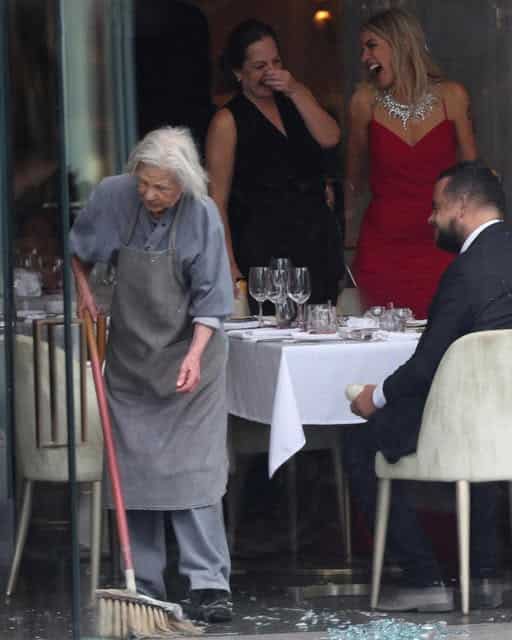A group of four swept into the dining room — two men and two women, all designer clothes, manicured gestures, the kind of people who believe volume equals importance. They were seated directly behind us, and within minutes, their voices filled the room. They complained about the wine, bragged about their vacations, dropped names like breadcrumbs. The pianist’s gentle music barely stood a chance.
And then, a sharp sound — the crash of glass. A wineglass had tipped, crimson spilling across the marble floor.
The cleaner appeared almost instantly. She was small, maybe late sixties, gray hair neatly pinned, her uniform faded from years of use. She knelt without hesitation, murmuring apologies, sweeping the shards with quiet precision. Her hands shook slightly, but her movements were practiced, careful.
“Don’t they have anyone younger working here?” one of the women said loudly, her tone dripping with contempt. “What is this, a retirement program?”
Her companion laughed. One of the men added, “Maybe she’s part of the décor. Vintage theme, right?”
I felt the air shift. My fingers tightened around my fork. The cleaner kept her head down, pretending not to hear.
The blonde woman dropped her napkin deliberately near the older woman’s hand. “Missed a spot,” she said sweetly. “Maybe you need glasses at your age?”
The cleaner froze — just for a heartbeat — and then resumed wiping the floor, her silence louder than any protest could be.
“Are you hearing this?” I whispered to David.
“I’m hearing it,” he said, his voice low but hard.
He stood. The scrape of his chair silenced the room. He crossed to the cleaner and crouched beside her.
“Let me help you with that,” he said.
She startled. “Oh no, sir, please — I can manage.”
“No one should have to do this alone,” he replied. “Especially not while people sit by and treat you like this.”
The blonde woman’s laugh faltered. “That’s really not—”
“It is,” David interrupted, looking directly at her. “You’ve already said enough. The only thing cheap about this place right now is your behavior.”
The words landed like a slap. The room fell still, save for the faint hum of the piano. The manager appeared, drawn by the tension.
“This isn’t the kind of atmosphere you allow here, is it?” David asked evenly.
The manager hesitated for half a breath, then straightened. “It isn’t.” He turned to the group. “I’ll have to ask you to leave.”
The woman’s face flushed crimson. “You can’t be serious. I ordered lobster.”
“I’m serious,” the manager said. “Please gather your things.”
Chairs scraped, voices hissed, but they left — their exit followed by a silence that slowly turned into something else. Someone began clapping, then another, until the entire dining room joined in. The cleaner — Martha, we would later learn — blinked fast, caught between embarrassment and gratitude.
When she finally stood, she whispered, “Thank you.”
Later, when the check arrived, David asked if she could come by our table. She did, hesitant, smoothing her apron. Up close, she looked even smaller, her eyes kind but tired.
“You shouldn’t have had to stand there and take that,” I said.
She smiled faintly. “I’ve cleaned all my life. You get used to people like that.”
“You shouldn’t have to get used to cruelty,” David said softly.
We talked for a while. She told us she’d been working there for ten years. The late shifts paid a bit more, which helped her support her granddaughter, Emily, who was studying nursing. Her husband had passed away five years ago. “The job keeps me moving,” she said. “And sometimes, people are nice.”
When we left, David slipped an envelope into her hand. “It’s gratitude,” he said when she tried to refuse. “Not charity. And my card’s inside. If you ever need anything, call.”
Tears welled in her eyes. “God bless you both,” she whispered.
Outside, the air was crisp. We didn’t speak much on the drive home. Some nights don’t need words; they just need to settle quietly into who you are.
A week later, a card arrived. The handwriting was careful and shaky.
I used part of what you gave me to buy my granddaughter her nursing textbooks. She cried when I told her what happened. She cried more when I told her what you did. You reminded us that kindness still exists. —Martha
A few days later, we met Martha and Emily at a small coffee shop by the park. Martha wore a bright blue scarf, and Emily, in lilac scrubs, had her grandmother’s soft eyes. We shared coffee and cheesecake, laughter and stories. When it was time to go, Martha hugged me tightly. “You gave me more than help,” she said. “You reminded me I matter.”
Months passed. Sometimes the phone rang, and it was Martha, just checking in. The last time she called, she was laughing. “Emily made the Dean’s List,” she said proudly. “She’s volunteering at a clinic. Says she wants to work with the elderly — says they get forgotten. She’ll start with me, of course.”
That night, I told David. He smiled, that quiet, certain smile of his, and reached for my hand. “Best anniversary gift we could’ve given each other,” he said.
He was right.
Kindness doesn’t need fanfare. It doesn’t shout or demand recognition. It moves quietly — one small act at a time — reshaping the world in invisible ways. One clap becomes two. One voice becomes many. One woman, humiliated and then reminded of her worth, stands taller.
We went out to celebrate us, but the night became something else — a story about dignity, decency, and how one person’s courage can shift an entire room. It’s a story I keep close, like a photograph pinned to the fridge. A reminder that goodness still lives in ordinary moments — in a hand extended, a truth spoken, and a kindness that lingers long after the plates have been cleared.

